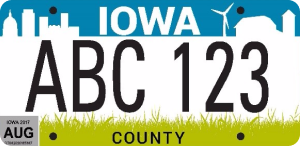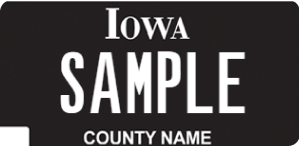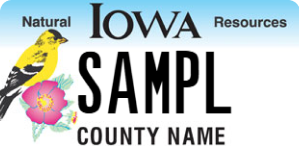In Iowa, the Department of Transportation (DOT) regulates license plate lookups, allowing individuals to access vehicle information for various purposes. As of 2023, over 4.6 million vehicles are registered in the state, and license plate lookups can provide details such as ownership and liens.
Law enforcement also uses these lookups to access accident records, contributing to safety efforts, including tracking traffic fatalities, which dropped from 356 in 2021 to 337 in 2022.
By keeping vehicle information accessible through these lookups, Iowa helps keep the public informed and up to date.
Why Run a License Plate Search in Iowa?
License plate searches in Iowa serve crucial functions for legal, personal, and safety reasons. These searches promote road transparency and accountability for individuals, businesses, and law enforcement. Reasons for conducting an Iowa license plate search include:
- Buyers can check for past accidents, theft, or tampering.
- It guarantees the seller has legal ownership of the vehicle for sale.
- It reveals unpaid parking tickets or traffic infractions.
- It shows whether the vehicle has been salvaged or damaged.
- It helps identify any active liens to avoid ownership complications during purchase.
- It helps providers confirm registration and prevent fraud.
- It aids law enforcement in solving hit-and-run cases.
- It assists authorities in tracking stolen vehicles or confirming their retrieval.
- It enables rental companies and fleet managers to monitor registration status.
- Regular checks help keep vehicles compliant with registration requirements.
Is it Legal to Perform a License Plate Lookup in Iowa?
Conducting a license plate lookup in Iowa is legal, but it must comply with state and federal laws to protect privacy and maintain responsible use of information. In this state, the Iowa Open Records Law (IORL) and the Driver's Privacy Protection Act (DPPA) impact the access of vehicle information through license plate lookup.
While the IORL promotes public access to certain government records, including vehicle-related data, the search is subject to limitations to prevent the misuse of personal information. The DPPA restricts access to sensitive driver and vehicle information, such as names, addresses, and contact details.
Under the DPPA, only specific entities, including law enforcement officers, insurance companies, and qualified individuals, are permitted to access personal information. Valid reasons for accessing restricted information through a license plate search include:
- To investigate traffic violations
- To track down stolen vehicles
- To verify ownership for transactions
- To manage vehicle fleets
- To support research findings
- To serve as evidence during legal proceedings
Using information obtained from a license plate lookup for unlawful purposes, such as stalking, harassment, or identity theft, carries severe penalties. Violations can result in fines, along with civil lawsuits from affected individuals.
How Can You Conduct a Iowa License Plate Lookup?
Performing a license plate lookup in Iowa is possible through official channels. These options comply with state and federal regulations and help individuals obtain essential details without violating privacy laws.
For the most accurate results, consult the following trusted channels:

Iowa DOT (Department of Transportation)
The Iowa DOT allows requests for vehicle-related records, though it does not provide a specific online platform for license plate lookups. To perform a lookup, individuals may need to visit an Iowa DOT office or call directly at 515-239-1101. The request must comply with the IORL (Iowa Open Records Law) and the DPPA (Driver’s Privacy Protection Act).
Visiting or calling directly allows individuals to get more accurate and updated information on license plate lookups and related information.

Approved NMVTIS Data Providers
Since the Iowa DOT’s services are limited, individuals can turn to National Motor Vehicle Title Information System (NMVTIS) providers for alternative vehicle data. NMVTIS-approved providers do not provide personal details but offer essential information like title history, salvage status, and theft reports based on a vehicle’s license plate.
This option is particularly useful for buyers, insurers, and fleet managers verifying the history of a vehicle during transactions. Examples of these providers include the following:
- GoodCar.com
- InfoTracer.com
- Recordsfinder.com
- StateRecords.org
To look up a license plate through any of these NMVTIS providers, individuals will need to navigate to the dedicated search bar. Select “Iowa” as the state and enter the vehicle’s license plate number. The search is fast and will give instant results.
What Information Can You Obtain from a Iowa License Plate Lookup?
Iowa license plate searches can provide crucial vehicle information, with options for basic or in-depth reports.
Basic Lookup
A simple license plate lookup offers limited but valuable details, such as the following:
- Vehicle specifications (make, model, year)
- Physical characteristics (body type, color)
- License plate expiration date
- Vehicle type (SUV, sedan, truck, etc.)
- Transmission type
- Drive configuration
- Engine specifications
- Warranty details
- Manufacturer's Suggested Retail Price (MSRP)
- Current registration status (sometimes)
This information is meant to accomplish simple tasks only, such as confirming vehicle descriptions and registration status.
Comprehensive Reports
For more thorough insights, comprehensive reports are available, potentially through NMVTIS-approved providers or with Iowa DOT assistance. These reports may include:
- Complete title and ownership history
- Previous registration and maintenance records
- Salvage or junk designations
- Sale dates, prices, and mileage
- Theft records and recovery status
- Odometer readings and potential discrepancies
- Active lien information
- Accident history and insurance claims
- Vehicle designation, e.g., taxi, police vehicle
- Damage reports, e.g., fire damage, flood damage
- Official NMVTIS documentation
Detailed reports are particularly useful for those who want to uncover hidden issues, such as undisclosed accidents or title problems. These comprehensive searches provide a full picture of a vehicle's background for better decision-making.
Keep in mind that because of the DPPA (Driver's Privacy Protection Act), comprehensive reports do not include personal information. These details are restricted to authorized entities only or individuals with explicit permission.
What Does an Iowa License Plate Look Like?
Iowa's license plates have a distinctive design that combines state identity with vehicle identification requirements. The Iowa DOT issues various plate types to meet different needs and regulations.
A typical standard license plate in Iowa is meant for cars and trucks. It features a typical county design and has the following components:
- Unique identifier: An alphanumeric sequence specific to each vehicle
- State branding: "Iowa" prominently displayed at the top
- County name: The name of the county where the vehicle is registered
- Visual elements: Often includes background imagery of rural or urban scenes
- Registration indicators: Stickers showing expiration month and year in designated corners

Iowa's current standard license plate is a newer design unveiled in 2018, known as the “City and County Reboot.” The new design features a light blue sky with silhouettes of urban landmarks, a wind turbine, and a farm building. These elements symbolize Iowa’s blend of metropolitan and rural life. A green grass field at the bottom highlights the state’s agricultural roots.
This updated design replaced the earlier "county standard" plates. It uses black alphanumeric characters for clarity and includes a reflective coating to enhance nighttime visibility.
Specialty License Plate in Iowa
In addition to standard license plates, individuals in Iowa can choose specialty or personalized plates through the Iowa DOT. These plates serve various purposes and offer custom designs to reflect personal preferences. Popular examples include the Blackout and Natural Resources plates, each featuring unique visuals and customization options.


For detailed information about available specialty plate options, interested individuals can visit the "License Plates" section on the Iowa DOT's official website.
Frequently Asked Questions (FAQs)
Here are answers to FAQs related to conducting a license plate lookup in Iowa:
Can I Look Up IA License Plates for Free?
The Iowa DOT does not offer a dedicated free platform for license plate lookups. Access to vehicle information typically requires a formal request and payment of applicable fees. For more detailed reports, third-party services from approved NMVTIS data providers may be available, but these also usually charge a fee for their services.Do All Iowa License Plate Lookups Work for Custom or Personalized Plates?
Iowa license plate searches apply to both custom and personalized plates, as they are registered like standard plates. However, results only provide vehicle-related data, with owner details remaining confidential. Variations in results may occur due to different plate designs. For the most accurate information, it is best to confirm with the Iowa DOT.How Long Does a Typical Iowa License Plate Lookup Take?
License plate lookup times vary by method. Iowa DOT requests may take several days, especially if mailed. On the other hand, online searches through NMVTIS-approved providers typically yield results within minutes.Can I Perform Bulk License Plate Lookups in Iowa?
Due to DPPA privacy laws, bulk license plate lookups are generally unavailable to the public. However, organizations and businesses with legitimate purposes for requiring multiple license plate lookups can set up an escrow account with the Iowa DOT. They can then submit their lookup requests to Vehicle.RecordPolicy@iowadot.us.Are There Any Alternatives to a License Plate Lookup for Obtaining Vehicle Information in Iowa?
Other options for obtaining vehicle information include VIN (Vehicle Information Number) checks through NMVTIS-approved providers like Goodcar.com and InfoTracer.com. Additionally, individuals can request driving records from the Iowa DOT. Keep in mind, though, that this method has more requirements.
